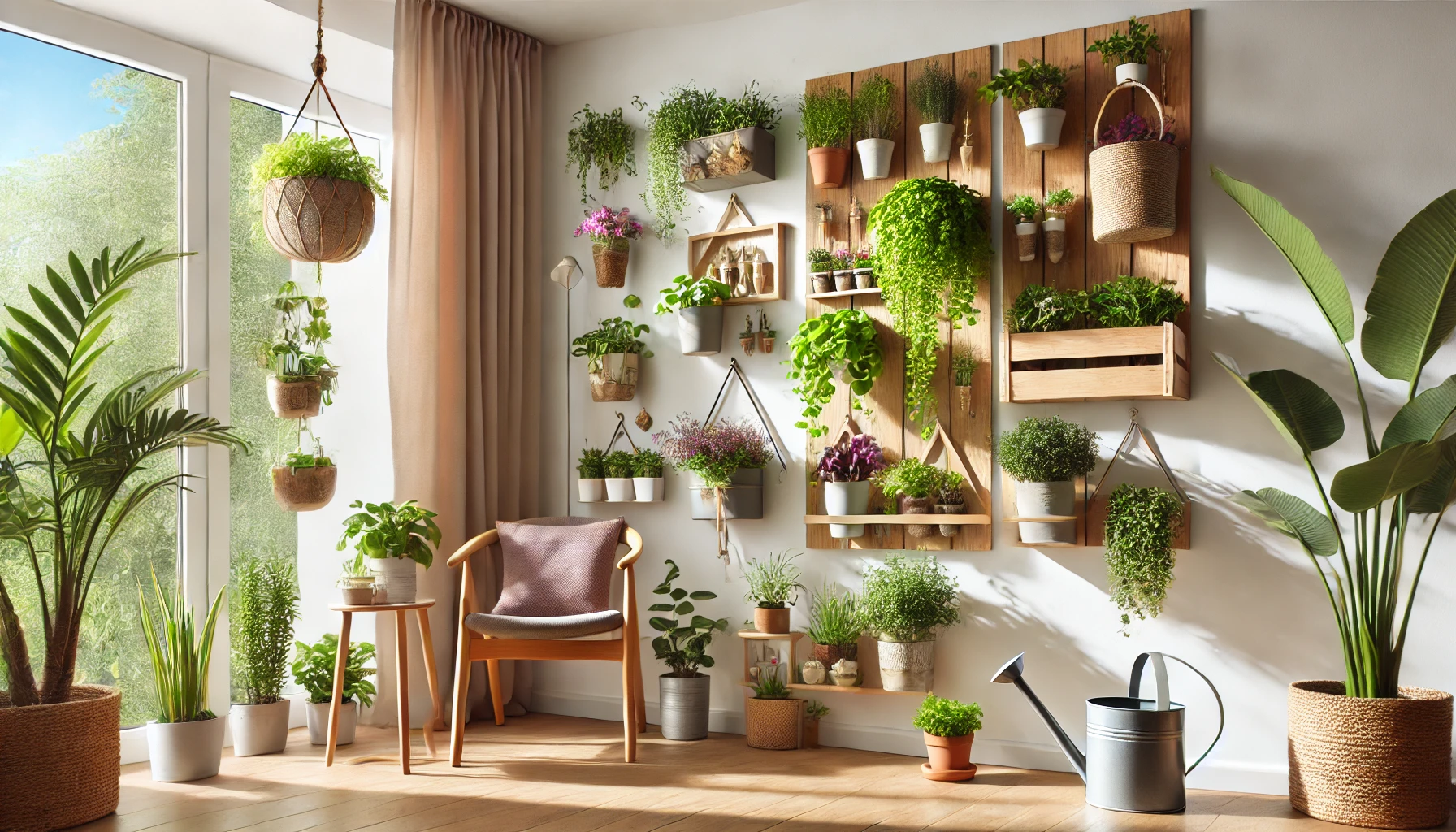Living in an apartment doesn’t mean you have to give up on gardening. A vertical garden is the perfect solution for small spaces, allowing you to grow flowers, herbs, and even vegetables without taking up valuable floor space. Whether you have a balcony, a small patio, or just an indoor wall, this guide will show you how to create a beautiful and functional vertical garden.
1. What Is a Vertical Garden?
A vertical garden is a gardening method where plants grow upward instead of outward. This can be achieved using shelves, wall-mounted planters, hanging pots, or even hydroponic systems. Vertical gardens are perfect for:
- Small apartments with limited space
- Urban dwellers who don’t have access to a yard
- People who love plants but want a stylish, space-saving setup
2. Benefits of a Vertical Garden
Creating a vertical garden has many advantages:
✅ Space-saving – Perfect for balconies, patios, and indoor spaces.
✅ Aesthetic appeal – Adds greenery and beauty to walls or corners.
✅ Air purification – Plants improve indoor air quality.
✅ Better plant growth – Prevents overcrowding and improves sunlight exposure.
✅ Easy maintenance – No need to bend down, making watering and pruning simpler.
3. Choosing the Right Location
Before setting up your vertical garden, decide on the best location. Consider the following:
🌞 Light availability – Most plants need at least 4-6 hours of sunlight. Choose a bright wall or balcony with good natural light.
🏡 Indoor or outdoor? – Indoor vertical gardens need plants that thrive in indirect light, while outdoor gardens can handle direct sun.
💧 Accessibility for watering – Make sure your plants are easy to reach so you can water and care for them without hassle.
4. Best Plants for a Vertical Garden
🌿 Herbs (Perfect for Cooking!)
- Basil
- Mint
- Rosemary
- Thyme
- Oregano
🌸 Flowers (For a Beautiful Display)
- Petunias
- Marigolds
- Begonias
- Ferns
- Orchids
🍃 Leafy Greens (Great for Small Spaces!)
- Lettuce
- Spinach
- Kale
- Microgreens
🌵 Low-Maintenance Plants
- Succulents
- Pothos
- Snake Plant
- Spider Plant
Choose plants based on the light conditions and climate in your apartment.
5. Types of Vertical Gardens
1. Hanging Pots
One of the simplest options—just hang pots on a wall-mounted rack or ceiling hooks. Great for herbs and trailing plants like pothos.
2. Wall Planters
These are shelves or pockets attached to a wall, holding small pots or plant pouches. Perfect for flowers and small herbs.
3. Pallet Gardens
A DIY-friendly option: use a recycled wooden pallet to attach small pots. Great for an eco-friendly, rustic look.
4. Hydroponic Systems
For a modern touch, hydroponic vertical gardens allow plants to grow without soil, using a nutrient-rich water system. Ideal for leafy greens.
5. Trellis or Climbing Plants
If you have a balcony, train climbing plants like ivy or jasmine to grow up a trellis or wire mesh.
6. How to Set Up Your Vertical Garden
Here’s a simple step-by-step guide:
Step 1: Gather Materials
✔ Wall-mounted planters, shelves, or hanging pots
✔ Soil or hydroponic system (depending on your choice)
✔ The right plants for your space
✔ Hooks, nails, or brackets for installation
✔ Watering system (self-watering pots or drip irrigation for easier care)
Step 2: Install the Structure
Secure shelves, racks, or pots on your chosen wall using nails, screws, or adhesive hooks (for renters who can’t drill holes).
Step 3: Arrange Your Plants
Place taller plants on top and smaller plants lower to maximize sunlight distribution.
Step 4: Water Properly
- Use self-watering pots or a simple drip irrigation system.
- Avoid overwatering—good drainage is key!
- Check moisture levels regularly.
Step 5: Maintain Your Vertical Garden
- Trim overgrown plants to keep everything neat.
- Rotate plants occasionally for even light exposure.
- Replace unhealthy plants when needed.
7. Final Tips for a Thriving Vertical Garden
💡 Use lightweight pots – Heavy pots can damage walls. Choose plastic or fabric planters instead of ceramic.
💡 Go vertical in style – Choose stylish pots and arrangements to make your vertical garden part of your home decor.
💡 Monitor for pests – Vertical gardens are less prone to pests, but keep an eye out for aphids or fungus.
💡 Experiment and have fun! – Gardening is a learning experience. Try different plants and setups to see what works best.
Enjoy Your Green Oasis! 🌱
With the right setup, even a tiny apartment can have a flourishing vertical garden. Whether you want fresh herbs for cooking or a beautiful green wall, this method allows you to garden without taking up too much space. Start small, experiment, and watch your plants thrive!

